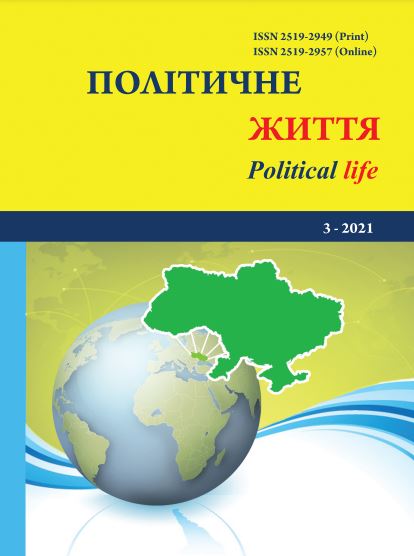Democratic Retrofits: Criteria and Factor
DOI:
https://doi.org/10.31558/2519-2949.2021.3.4Keywords:
democracy; transformations; changes; democratic regime; political transformationsAbstract
The article is aimed at studying democratic changes in terms of characterization of criteria and factors of these transformations. The modern political process can have different trajectories and fluctuations. They determine the directions of political transformations. These can be a wide range of political regimes: from democracies to new forms of autocracy and dictatorships. And it is important here to determine what are the objective conditions that promote or hinder the formation of new democratic institutions. Therefore, this article draws attention to the identification of key factors influencing the trajectories and results of regime change. Directly, attention is paid to the analysis of factors and processes that are important to explain the nature and results of regime transformations.
It is determined that the urgent task now is to use the opportunities that arise in transition processes in changing societies. This is necessary to simultaneously deepen the challenges facing democracy and development. There is a need to ensure that national development plans and economic reforms are comprehensive and collective, that state institutions become more accountable and that the structure of electoral and constitutional processes ensures the maximum participation of citizens, especially minorities, women and vulnerable groups. Accountability and transparency, based on the principle of checks and balances, are the main components that in the coming years will remain one of the most important tasks for countries where democracy is being formed and this is crucial for their development prospects.
It is justified that the traditional approach to strengthening democracy should be reconsidered, as well as the generally accepted procedures for providing development assistance. The concept of democratic development should also be further developed. Particular attention should be paid to defining the purpose of such development: eliminating isolation in strengthening democracy and the practice of partnership for development, especially in terms of coherence of their implementation, determining the level of influence of rights and participation of citizens on the likelihood of sustainable progress.
References
Altman D. Citizenship and Contemporary Direct Democracy Pontificia Universidad Catolica de Chile. Cambridge University Press. 2018, 135.
Драчук С. Демократичний рейтинг України дещо зріс, але перед нею стоять виклики в дотриманні демократії. Freedom House. 2020. https://www.radiosvoboda.org/
Кауфманн Б. Десять признаков демократического общества с точки зрения Швейцарии. 2019. https://www.swissinfo.ch/
Томмазоли М. Демократия и развитие: роль ООН. ИИДЕА, 2013, 65 с.
Шаповалов С. Україна на терезах демократії: Індекс Freedom House. Фонд «Демократичні ініціативи» імені Ілька Кучеріва в рамках Програми сприяння громадській активності «Долучайся!», 2020. https://dif.org.ua/

